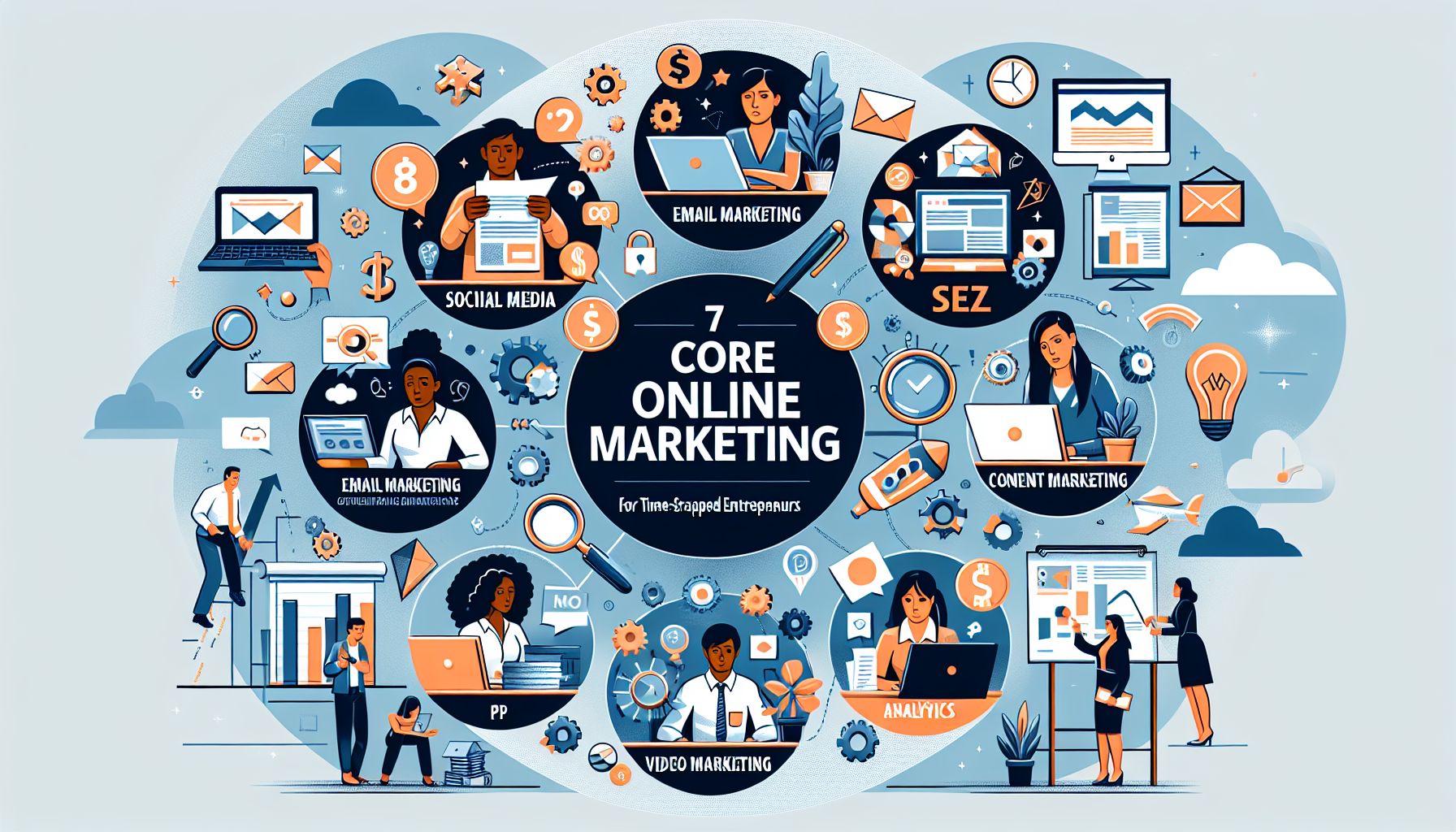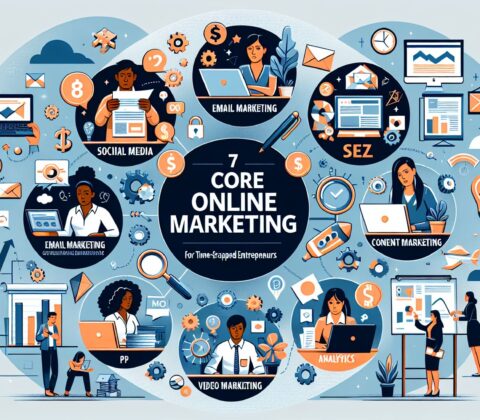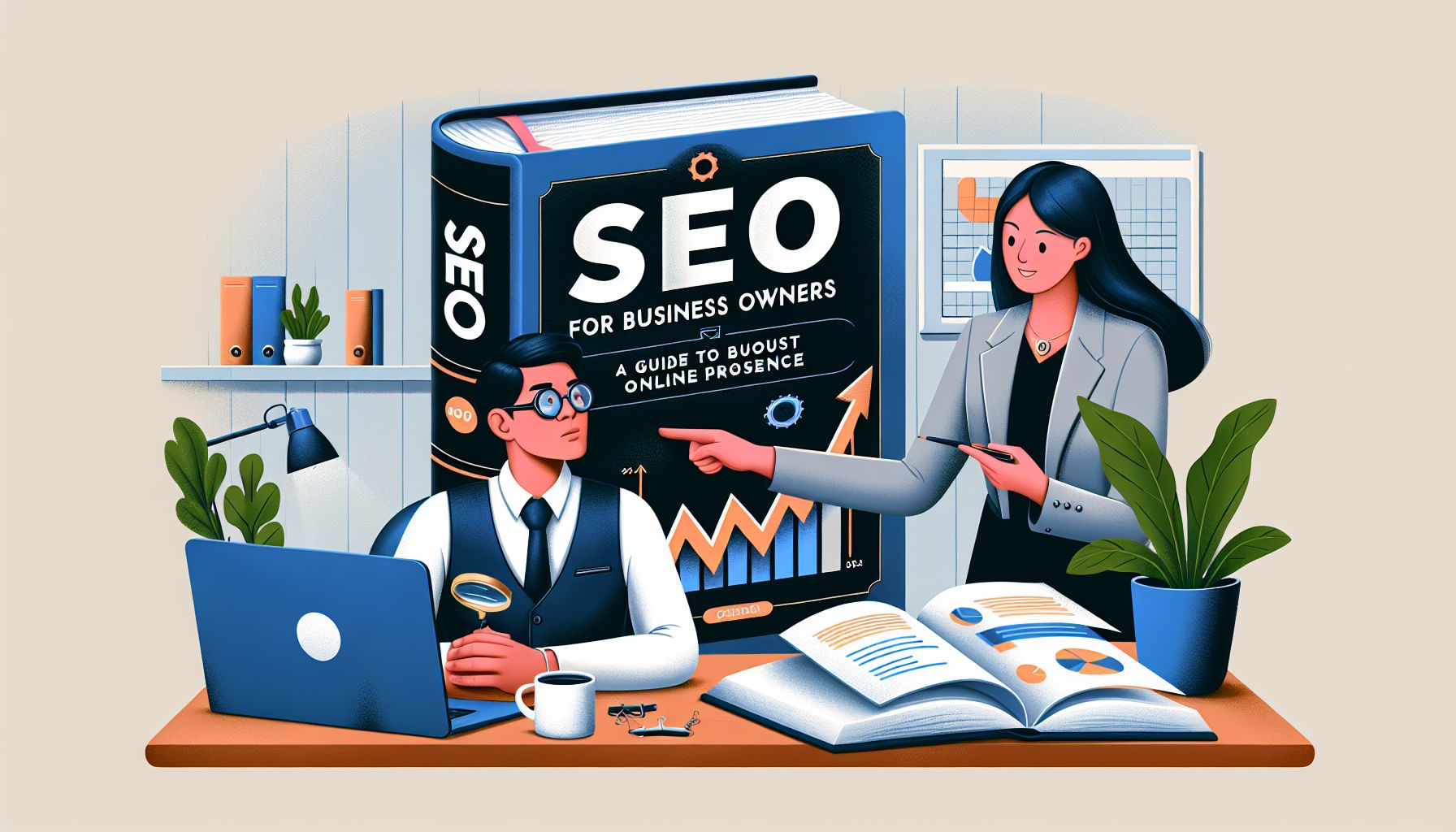Monthly Archives: January 2024


Web Design Tips for Small Business Owners
Running a small business in today’s digital age requires a strong online presence. Your website is often the first point of contact for potential customers, so it’s crucial to make a positive impression. However, creating an effective website can be a daunting task, especially if you have limited experience with web design. In this article, we will share some essential web design tips to help small business owners create a successful online platform.
1. Keep it Simple and User-Friendly
When it comes to web design, simplicity is key. A cluttered and confusing website can discourage visitors from exploring further and potentially lead to missed opportunities. Keep your design clean and organized, ensuring that important information is easy to find. Use clear headings, concise content, and intuitive navigation menus to enhance user experience.
2. Use Responsive Design
In this mobile-driven era, it’s crucial that your website is responsive. This means that it should adapt to fit various screen sizes and devices, including smartphones and tablets. Responsive design ensures that your website looks and functions optimally, regardless of the device being used to access it. Failure to implement responsive design may result in frustrated users who abandon your site for a more user-friendly competitor.
3. Optimize for Search Engines
Having a beautifully designed website is useless if potential customers can’t find it. Implementing search engine optimization (SEO) techniques can greatly improve your website’s visibility on search engine results pages. Research and identify relevant keywords to integrate into your page titles, headings, and content. Additionally, improve your website’s loading speed, as search engines tend to favor faster-loading sites.
4. Include Clear Calls-to-Action
Your website should guide visitors towards taking certain actions, such as making a purchase or scheduling a consultation. To achieve this, strategically place clear and compelling calls-to-action (CTAs) throughout your site. Use contrasting colors, strong verbs, and concise copy to capture the attention of your audience. Consider A/B testing different CTAs to determine what resonates most with your target audience.
5. Ensure Fast Loading Speeds
In today’s fast-paced digital world, speed is crucial. Studies have shown that visitors are likely to abandon a website that takes more than a few seconds to load. Optimize your website for speed by compressing images, minimizing the use of heavy multimedia, and leveraging caching techniques. Regularly monitor your site’s loading speed and make necessary adjustments to boost performance.
6. Integrate Social Media
Social media platforms are powerful tools for small businesses. Integrate social media buttons and feeds on your website to encourage visitors to engage with your profiles and share your content. This will help you expand your online presence, increase brand awareness, and drive more traffic to your website. Additionally, include social sharing buttons on your blog posts or product pages to make it easy for visitors to share your content with their network.
7. Prioritize Content Quality
While a visually appealing design is important, the quality of your content is equally vital. Ensure that your website provides valuable and relevant information to your audience. Well-written and engaging content helps establish your credibility and authority within your industry. Regularly update your website with fresh content, such as blog posts or case studies, to keep visitors coming back for more.
8. Invest in Professional Photography
Images play a fundamental role in web design. Low-quality or generic stock photos can make your website appear unprofessional and undermine your brand. Investing in professional photography, tailored to your business and brand identity, can significantly enhance the overall aesthetic and authenticity of your website. High-quality images can create an emotional connection with your audience and leave a lasting impression.
9. Test and Improve
Web design is an ongoing process. Regularly test and analyze your website’s performance to identify areas for improvement. Monitor user behavior, such as click-through rates and time spent on specific pages, to gain insights into how visitors interact with your site. Additionally, solicit feedback from your customers to understand their perspective and identify any pain points or areas of confusion.
Conclusion
Designing an effective website for your small business doesn’t have to be a daunting task. By focusing on simplicity, responsiveness, SEO, calls-to-action, loading speeds, social media integration, content quality, professional photography, and continuous improvement, you can create a compelling online presence that attracts and engages visitors. Remember, your website is a reflection of your brand, so invest the time and effort needed to craft a website that truly represents your business in the best possible light.


The Ultimate Guide to Online Marketing for Business Owners
As a business owner, you are constantly looking for ways to grow and expand your business. In today’s digital age, one of the most effective strategies is online marketing. With the power of the internet, you have the opportunity to reach a vast audience and increase your brand’s visibility like never before. In this ultimate guide, we will walk you through the essentials of online marketing and how you can leverage it to take your business to new heights.
Why Online Marketing Matters
In an increasingly digital world, online marketing has become essential for businesses of all sizes. Traditional marketing methods like print advertisements or billboards simply cannot compete with the reach and cost-effectiveness of online marketing. With online marketing, you can easily target specific demographics, measure your results, and make data-driven decisions to optimize your strategies. It’s not just about having a website or a social media presence; it’s about utilizing the full range of online marketing tools to effectively engage with your target audience.
Building a Strong Online Presence
The first step in online marketing is to build a strong online presence. This starts with creating a professional website that clearly communicates your brand and offerings. Your website should not only be visually appealing but also user-friendly, with clear navigation and informative content. It’s important to ensure that your website is mobile-responsive as well since a significant portion of internet users now access websites through their mobile devices.
In addition to your website, social media platforms are a must for any business looking to succeed online. Identify the platforms that are most relevant to your industry and target audience, and create engaging profiles on those platforms. Regularly post relevant content, interact with your followers, and leverage the power of hashtags to expand your reach. Social media provides a unique opportunity to directly connect with your customers and build brand loyalty.
Search Engine Optimization (SEO)
Now that you have your website and social media profiles set up, it’s time to focus on driving traffic to your online platforms. This is where search engine optimization (SEO) comes into play. SEO is the practice of optimizing your website and online content to improve its visibility in search engine results. By strategically incorporating relevant keywords, creating high-quality content, and optimizing your website’s structure, you can significantly improve your organic search rankings.
However, SEO is a complex and ever-evolving field, so it can be beneficial to seek professional assistance. Many digital marketing agencies specialize in SEO and can help you navigate the intricacies of optimizing your online presence.
Pay-Per-Click (PPC) Advertising
While SEO focuses on organic search rankings, pay-per-click (PPC) advertising allows you to instantly reach your target audience through paid advertisements. PPC advertising platforms, like Google Ads or social media advertising, provide businesses with a range of targeting options to ensure that your ads are shown to the right people at the right time. PPC advertising is a highly effective way to generate immediate traffic and conversions.
It’s important to set a clear budget and actively monitor your PPC campaigns to ensure you are getting the best return on your investment. Test different ad variations, keywords, and targeting options to find what works best for your business. Consider working with a digital marketing agency to leverage their expertise in maximizing the effectiveness of your PPC advertising.
Content Marketing
In the digital age, content is king. Content marketing involves creating and distributing valuable, relevant, and consistent content to attract and retain a clearly-defined audience. This can include blog posts, videos, infographics, podcasts, and other forms of media. By providing valuable content, you establish yourself as an industry expert and build trust with your audience.
It’s important to develop a content marketing strategy that aligns with your business goals and target audience. Regularly publish content on your website and share it across your social media platforms. Engage with your audience through comments and encourage them to share your content with their networks. Content marketing requires dedication and consistency, but the long-term benefits can be tremendous.
Utilizing Email Marketing
Email marketing is a highly effective way to communicate directly with your customers and nurture relationships. By collecting email addresses through your website or social media platforms, you can build an email list and send targeted messages directly to your subscribers. Segment your email list based on relevant criteria, such as demographics or purchase history, to ensure that your messages are personalized and relevant to each recipient.
Email marketing can be used for a variety of purposes, such as announcing new products or services, sharing valuable content, or offering exclusive promotions. However, it’s important to strike a balance between sending regular updates and avoiding spamming your subscribers. By providing value and respecting your subscribers’ privacy, email marketing can be a highly effective tool in your online marketing arsenal.
Measuring and Analyzing Results
Finally, one of the biggest advantages of online marketing is the ability to measure and analyze your results. It’s crucial to set key performance indicators (KPIs) for each marketing channel and regularly track your performance. Utilize analytics tools like Google Analytics to gain insights into your website traffic, user behavior, and conversion rates.
By analyzing your data, you can identify what is and isn’t working and make data-driven decisions to optimize your strategies. Continuously test and experiment with different approaches and measure your results to optimize your online marketing efforts.
Conclusion
Online marketing is no longer optional for businesses; it is essential for success in today’s digital world. By building a strong online presence, utilizing SEO and PPC advertising, implementing content marketing, and leveraging email marketing, you can effectively reach and engage with your target audience. Remember to regularly measure and analyze your results to continuously improve and refine your strategies. Embrace the power of online marketing and take your business to new heights.


The Power of Internet Marketing: Boost Your Business with a Digital Edge
In this age of technology, it is crucial for business owners to embrace the power of internet marketing. The digital world provides endless opportunities to connect with potential customers, increase brand awareness, and drive sales. Whether you own a small local business or an established corporation, incorporating online marketing strategies can give your business the competitive edge it needs. Let’s delve deeper into the world of internet marketing and explore how it can benefit your business.
Understanding Internet Marketing
Internet marketing, also known as online marketing or digital marketing, refers to the promotion of products or services using various online channels. It encompasses a wide range of strategies, including search engine optimization (SEO), pay-per-click advertising (PPC), social media marketing, content marketing, email marketing, and many others.
Unlike traditional marketing methods such as print ads or television commercials, internet marketing leverages the power of the internet to target a specific audience, measure results, and adjust strategies accordingly. With the right techniques and tools, you can reach potential customers no matter where they are located, ensuring maximum exposure for your business.
The Benefits of Internet Marketing
-
Global Reach: One of the biggest advantages of online marketing is its ability to break geographical barriers. With a well-executed internet marketing campaign, you can reach customers from all around the world, expanding your customer base and potentially increasing profits.
-
Cost-Effective: Compared to traditional marketing methods, internet marketing is often more affordable. Many digital marketing strategies, such as social media marketing and content marketing, can be executed with little to no cost. This allows small businesses with limited marketing budgets to compete with larger corporations.
-
Targeted Advertising: Internet marketing allows you to target your audience with precision. Through tools like Google Ads, you can create highly specific ads that appear to users who are actively searching for your products or services. This ensures that your marketing efforts are focused on individuals who are most likely to convert into customers.
-
Measurable Results: Unlike traditional marketing, internet marketing provides detailed analytics and metrics to track the success of your campaigns. With tools like Google Analytics, you can monitor website traffic, conversion rates, and engagement levels, gaining valuable insights into your audience’s behaviors and preferences. This data allows you to optimize your strategies and improve your return on investment (ROI).
Key Internet Marketing Strategies
-
Search Engine Optimization (SEO): SEO is the process of optimizing your website and its content to rank higher in search engine results pages (SERPs). By improving your website’s visibility, you can attract organic traffic and increase your chances of converting leads into customers. Implementing SEO best practices, such as keyword research, on-page optimization, and link building, can significantly enhance your online presence and drive targeted traffic to your website.
-
Pay-Per-Click Advertising (PPC): PPC advertising allows you to display targeted ads to users who search for specific keywords or fit specific demographics. You only pay when someone clicks on your ad, making it a cost-effective advertising method. Google Ads is one of the most popular PPC platforms, allowing you to reach potential customers at the precise moment they are searching for your products or services.
-
Social Media Marketing: Social media platforms, such as Facebook, Instagram, and LinkedIn, provide excellent opportunities for businesses to connect with their target audience. By creating compelling content, engaging with followers, and running targeted ad campaigns, you can build brand loyalty, increase brand visibility, and ultimately drive sales.
-
Content Marketing: Content marketing involves creating and distributing valuable content to attract and retain a clearly defined target audience. Through blogging, video marketing, infographics, and other content formats, you can establish your business as an industry authority, build trust with potential customers, and drive organic traffic to your website.
Conclusion
Embracing internet marketing is no longer an option but a necessity for businesses. The digital world offers endless possibilities to connect with customers and make your mark in the competitive marketplace. By incorporating internet marketing strategies such as SEO, PPC, social media marketing, and content marketing, you can position your business for success, reach a global audience, and drive sustainable growth. So, step into the digital frontier and watch your business thrive in the online realm!


7 Essential Online Marketing Strategies for Busy Business Owners
Running a successful business in today’s digital age requires more than just a great product or service. It requires a strong online presence to reach and engage with your target audience. With the ever-increasing number of online marketing strategies available, it can be overwhelming for busy business owners to determine which ones are worth investing their time and resources in. In this article, we will explore seven essential online marketing strategies that every business owner should consider.
1. Develop a Comprehensive Website
A well-designed and user-friendly website is the cornerstone of any successful online marketing strategy. It serves as your virtual storefront, representing your brand and providing visitors with a clear understanding of what your business has to offer. Ensure that your website is optimized for search engines, mobile-friendly, and includes essential information such as contact details and a clear call-to-action.
2. Harness the Power of Search Engine Optimization (SEO)
In a competitive online landscape, appearing on the first page of search engine results is crucial. This is where search engine optimization (SEO) comes into play. Implementing SEO techniques helps your website rank higher in search engine results, driving organic traffic and increasing your visibility. Focus on optimizing your website’s content, meta tags, and URL structure to improve its SEO performance.
3. Leverage the Reach of Social Media
With billions of active users worldwide, social media platforms offer an excellent opportunity to connect with your target audience. Create meaningful and engaging content on platforms such as Facebook, Instagram, Twitter, and LinkedIn to drive brand awareness and customer engagement. Utilize social media analytics to better understand your audience and tailor your content to their preferences.
4. Embrace the Power of Content Marketing
Content marketing is a strategic approach that involves creating and distributing valuable and relevant content to attract and retain a clearly defined audience. By producing high-quality content such as blog posts, videos, and infographics, you can position yourself as an industry expert and gain credibility. Create a content calendar and publish regularly to keep your audience informed and engaged.
5. Utilize Email Marketing to Nurture Leads
Email marketing is a highly effective tool for nurturing leads and turning them into loyal customers. Build an email list by offering valuable content or exclusive promotions to your website visitors. Send personalized and targeted emails to your subscribers to keep them engaged and informed about your latest offers. Automation tools can make the process more efficient, enabling you to scale your email marketing efforts.
6. Invest in Pay-Per-Click (PPC) Advertising
Pay-per-click (PPC) advertising is an effective way to generate immediate visibility and drive targeted traffic to your website. Platforms such as Google Ads and social media advertising options like Facebook Ads allow you to set your budget and target specific demographics. Conduct thorough keyword research and create compelling ad copy to maximize the return on your investment.
7. Monitor and Analyze Your Results
To ensure the effectiveness of your online marketing efforts, it is crucial to monitor and analyze your results regularly. Utilize tools like Google Analytics to gain insights into your website traffic, user behavior, and conversion rates. Tracking key performance indicators (KPIs) will help you identify areas of improvement and make data-driven decisions to optimize your strategies.
In conclusion, implementing these essential online marketing strategies can significantly impact the success of your business. While it may seem overwhelming at first, taking it one step at a time and dedicating resources to each strategy will lead to long-term growth and profitability. Remember, consistency is key in maintaining a strong online presence. Embrace the power of digital marketing and watch your business thrive in the competitive online landscape.


SEO for Business Owners: A Guide to Boost Your Online Presence
In the digital age, having a strong online presence is crucial for the success of any business. With millions of websites competing for attention, how can you ensure that your business stands out from the crowd? The answer lies in Search Engine Optimization (SEO). In this guide, we will explore what SEO is, why it is important for business owners, and how you can optimize your website to improve your search engine rankings.
What is SEO and Why Does It Matter?
SEO is the practice of optimizing your website and its content to increase visibility in search engine results. When users search for products or services related to your business, you want your website to appear on the first page of search engine results pages (SERPs). Why? Because the first page receives the majority of clicks, and if your website is buried on the third or fourth page, potential customers are unlikely to find you.
But why does SEO matter for business owners specifically? Well, consider this: according to a study, 93% of online experiences begin with a search engine. If you want to attract new customers and grow your business, it is essential to ensure that your website appears prominently in search engine results. By optimizing your website for SEO, you increase your chances of being discovered by potential customers and drive more traffic to your site.
Understanding the Basics of SEO
To effectively optimize your website for search engines, you need to understand the basic principles of SEO. Here are a few key concepts to get you started:
1. Keywords: Keywords are the foundation of SEO. These are the words or phrases that users type into search engines when looking for something. Conduct keyword research to identify the most relevant and popular keywords related to your business. Incorporate these keywords naturally into your website’s content to improve its visibility in search engine results.
2. On-Page Optimization: On-page optimization refers to the practices you implement on your website to improve its search engine rankings. This includes optimizing your page titles, meta descriptions, headings, and URL structure. Ensure your website loads quickly and is mobile-friendly, as these factors also influence search engine rankings.
3. Quality Content: Quality content is crucial for SEO. Create informative, relevant, and engaging content that incorporates your target keywords. Regularly update your website with fresh content to attract both search engines and visitors.
4. Link Building: Link building involves acquiring high-quality backlinks from other websites to improve your website’s authority and credibility. Seek opportunities to guest post on reputable industry websites, collaborate with influencers, or participate in online forums related to your field.
Optimizing Your Website for SEO
Now that you have a basic understanding of SEO principles, it’s time to implement them on your website. Here are some steps you can take to optimize your website for better search engine rankings:
1. Conduct a Website Audit: Start by assessing your website’s current SEO performance. Identify areas that need improvement, such as slow page loading times, broken links, or missing meta tags. Use online tools to conduct a comprehensive website audit and address any issues that arise.
2. Keyword Optimization: Once you have identified your target keywords through research, strategically incorporate them into your website’s content. However, avoid keyword stuffing, as search engines penalize this practice. Instead, focus on delivering valuable content that resonates with both search engines and users.
3. Create Compelling Meta Tags: Meta tags, including the title tag and meta description, are prime real estate for optimizing your website. Craft compelling and concise tags that accurately describe your page’s content and entice users to click through to your website.
4. Improve Website Load Speed: Slow-loading websites not only frustrate users but also negatively impact search engine rankings. Compress images, minify CSS and JavaScript files, and leverage browser caching to improve your website’s load speed.
5. Mobile Optimization: With the increasing use of mobile devices, optimizing your website for mobile is essential. Ensure your website is mobile-friendly, responsive, and provides a seamless user experience across different devices.
6. Invest in High-Quality Content: Content is king when it comes to SEO. Deliver high-quality, well-written content that satisfies user intent. Incorporate relevant keywords naturally and regularly update your website with fresh content.
7. Build High-Quality Backlinks: Seek opportunities to earn backlinks from reputable websites in your industry. Guest posting, participating in online communities, and leveraging social media can all help you acquire valuable backlinks. Focus on quality over quantity to avoid being penalized by search engines.
Conclusion
As a business owner, optimizing your website for SEO is a vital step in attracting new customers and growing your online presence. By understanding the basics of SEO, optimizing your website’s on-page elements, and investing in quality content and backlinks, you can improve your search engine rankings and drive more organic traffic to your site. Remember, SEO is an ongoing process, so regularly monitor and adjust your strategies to stay ahead of the competition. With dedication and consistency, you will reap the rewards of a strong online presence and increased business success.